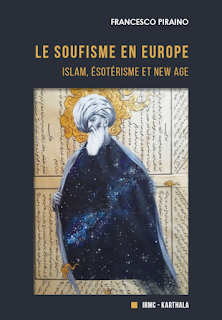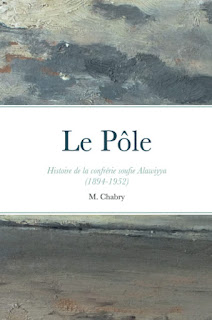Guest post by Felipe Souza
Recent trends indicate a continuation of the dissemination of Traditionalist ideology in Brazil. There is a growing interest in René Guénon among certain Catholic groups, especially those influenced by the late Brazilian Traditionalist and controversial public intellectual Olavo de Carvalho, as well as in some Islamic groups with connections to both Olavo and Western Sufism. There are other groups that have an interest in Guénon, but they are few.
In the right-wing political arena, the Movimento Brasil Livre (Free Brazil Movement) stands out, with one of its coordinators, Ricardo Almeida, publicly endorsing Guénon and Olavo, and maintaining ties with a local branch of a Sufi tariqa. The Nova Resistência (New Resistance) movement, a proponent of Duginism, flirts with Guénonism but primarily aligns itself with Julius Evola, possibly due to the author's and the movement's association with philofascism. Surprisingly, Nova Resistência has even infiltrated a traditional party, the PDT (Partido Democrático Trabalhista - Democratic Labor Party). A dissenting group from Nova Resistência, known as Sol da Pátria (Sun of the Homeland), also promotes ideas aligned with Guénonism, contributing to the recent spread of Traditionalism in Brazil and aiming to adopt historical symbols of national labor.
The leader of Nova Resistência, Raphael Machado, has delivered speeches at the Imam Hussein Cultural Center, a Shiite entity located in Rio de Janeiro. This Cultural Center not only hosted members of Nova Resistência, but also published a statement of solidarity regarding the recent assassination of Dugin’s daughter, Darya Dugina. Texts by Dugin and members of Nova Resistência have been published in Revista Minarete, issued by the Imam Hussein Center, although these publications are no longer available online.
Despite these scattered presences in the public space, it is the publishing houses that play the most significant role in disseminating Traditionalist works in Brazil. Noteworthy among these is the IRGET, the René Guénon Institute for Traditional Studies, which has existed for decades, holding a vast collection of translations of Guénon and authors such as Ananda Coomaraswamy, Julius Evola, and Seyyed Hossein Nasr. Works produced by IRGET find some diffusion even in academic circles, with academic papers citing publications from this institute. The late Luiz Pontual de Oliveira was in charge of IRGET. The quality of translations promoted by IRGET is a subject of controversy. Some critics argue that the fidelity and accuracy of these translations are points of contention. In addition to books, IRGET used to organize courses, which became increasingly infrequent until the cessation of its educational activities with the passing of Pontual.
Additionally, within the sphere of influence of IRGET, it is interesting to observe the presence of Freemasons and members of the Eubiose movement who consider the works of Guénon as influential references. For the Brazilian Society of Eubiose, Guénon’s The King of the World remains a referenced work, despite the controversies concerning it. A translation of this book was published by the Society of Eubiose, but has not been reissued.
A greater focus on Guénon's work emerged recently when a publisher started releasing his complete works. In 2022, Editora Bismillah (Bismillah Publishing) released the “Essential René Guénon Box” (with another box on the way, “René Guénon Metaphysical Explorations Box”) in collaboration with Editorial Estrela da Manhã (Morning Star Publishing), and published books by authors such as Titus Burckhardt, Sheikh Nazim al-Haqqani, Ibn Arabi, al-Ghazali, aligning them with Traditionalist rhetoric. With close relations with this publisher, the História Islâmica (Islamic History) portal recently dedicated a video to Guénon, while its sister portal, Iqara Islam, uses Guénon to conceptualize tradition.
In addition to Guénon's books, Estrela da Manhã has been organizing courses, available online, on Guénonian thought. Two representatives of this movement are frequently present in the classes, which are available on the YouTube video platform: Luiz Gonzaga de Carvalho, the son of Olavo, and Marcelo Cipolla, a professional translator and editor. Both had been working together for years at ICLS (Cultural Institute Lux et Sapientia), collaborating with another son of Olavo, Tales de Carvalho. The owner of História Islâmica, Mansur Peixoto, conducted an event with Marcelo Cipolla on Ibn Arabi, in collaboration with Bismillah Publisher, as well as participated in a live on YouTube about the Islamic presence in Brazil on Sol da Pátria’s channel
Bismillah Publisher / Editorial Estrela da Manhã meet the demand of readers eager for the works of Guénon, a demand that IRGET addressed for some time, not only by offering books but also courses. However, unlike IRGET, these courses are now available on online platforms.
In the realm of Schuonian Traditionalism, Mateus Soares de Azevedo stands out as a prolific author with an extensive body of work. Particularly noteworthy is Azevedo's collaboration with Schuon’s follower William Stoddart, with whom he published O Poder do Esquerdismo e o Politicamente Correto (The Power of Leftism and Political Correctness). Azevedo's writings delve into a spectrum of themes, including perennialism, Christianity, Sufism, and various related subjects explored across multiple articles. Beyond his noteworthy editorial contributions, Azevedo actively engages in Evolian Gatherings—dedicated study cycles focused on Julius Evola's work—and enjoys an international presence through publications with Traditionalist publishers such as World Wisdom and Sophia Perennis.
In contemporary times, César Ranquetat Jr. emerges as another author aligned with Traditionalism. Renowned for works like A Realeza de Cristo e a ideia de uma sociedade tradicional (The Kingdom of Christ and the Idea of a Traditional Society) and Da direita moderna à direita tradicional (From Modern Right to Traditional Right), Ranquetat champions the concept of the "traditional man" within the context of his Christian-oriented writings. In 2012, he wrote an article on Julius Evola's contributions in Brazil, expressing regret over the insufficient dissemination of the Traditionalist's oeuvre. This text was published on the Legio Victrix blog, dedicated to Dugin's Fourth Political Theory and with a neo-fascist outlook.
Publishing is one of the crucial foundations for the consolidation of a movement, especially one of an elitist nature resistant to becoming a mass ideology, as is the case with Traditionalism. Various Traditionalist groups, may, then have been expanding, more or less organized, their rhetorical and formative arsenal using the books of the aforementioned editorial groups.
In conclusion, Guénonism emerges as an intellectual force that permeates the knowledge systems and practices of a significant group of Brazilian Muslim and other Traditionalists. Olavo's main legacy seems to have been the creation of an environment that normalizes Guénon and his elitist ideas. Evola and Schuon end up being relegated to the background in this scene, despite having their own niches and followers. For advocates of spiritual elitism aspiring to propagate their convictions in Brazil, there is undoubtedly room for growth.








.png)







